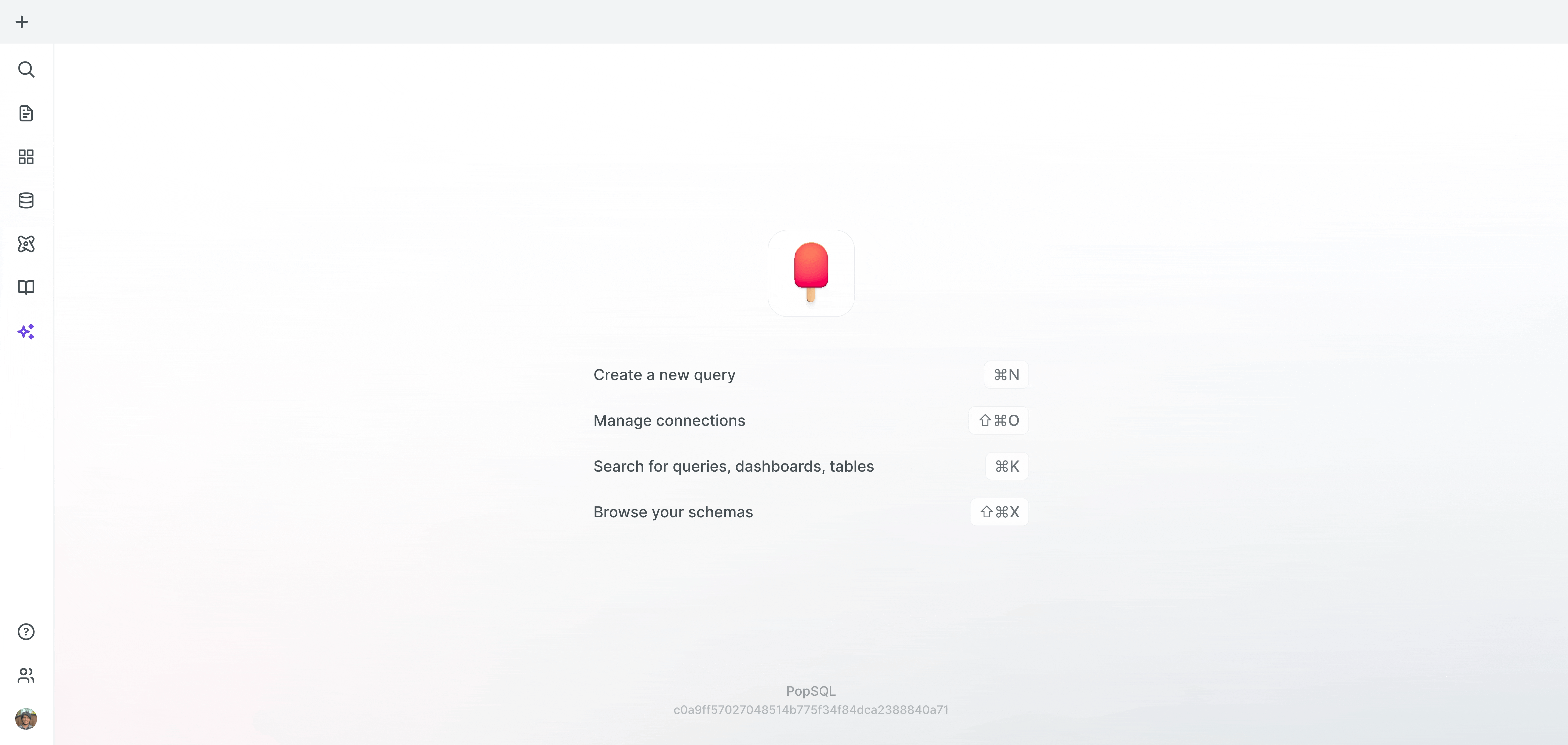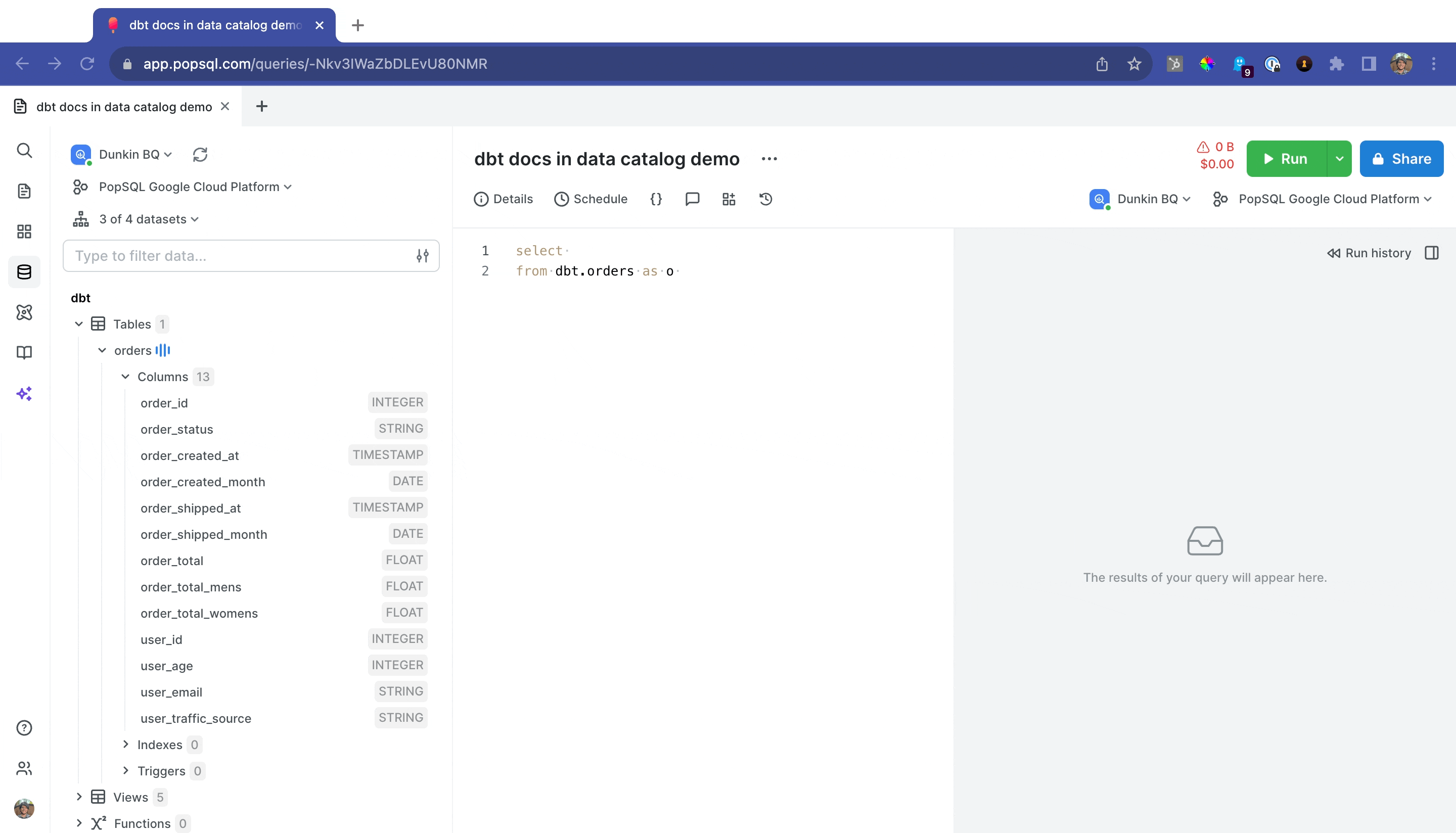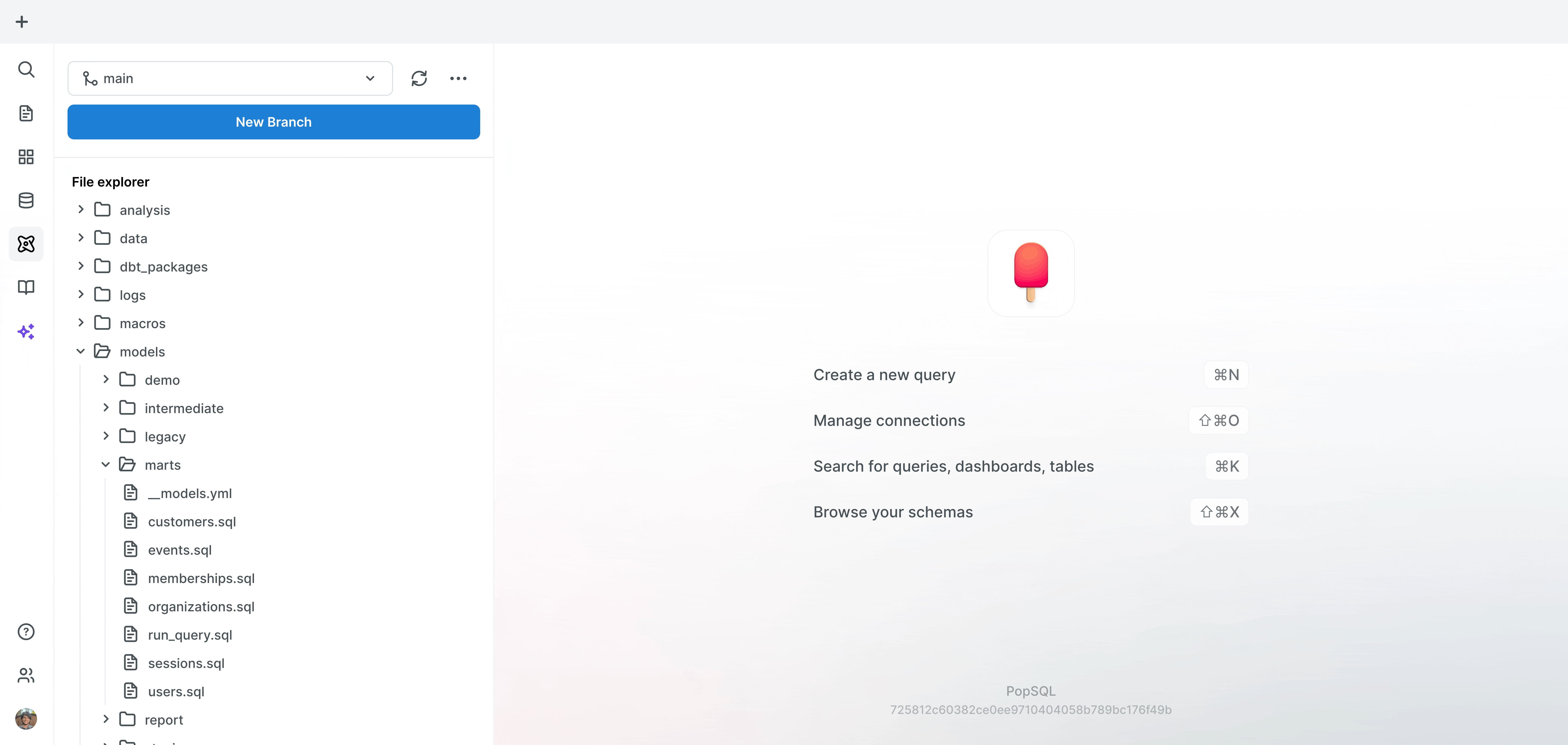Changelog
Latest product updates.
Follow us on Twitter to hear first.
PopSQL gets a fresh new look!

We're thrilled to announce a fresh new look for PopSQL! Following our recent acquisition by Timescale, we've been hard at work refining the app's visual identity to more closely align with Timescale's sleek and modern aesthetic. In our latest update, we've introduced a revamped color scheme designed to look stunning in both light and dark modes. We've also fine-tuned buttons, input fields, and numerous other elements to create a cohesive and consistent user interface.
We hope you enjoy the new design as much as we do! Stay tuned for more updates!
A new home for your files

We have started rolling out changes that unify queries, dashboards, and notebooks into a single file tree. This unlocks folder organization for all file types, and gives you the flexibility to mix file types in your folders as you see fit. This also brings along filtering, sorting, drag and drop, bulk delete, and context menu actions for the whole tree!
You should see these changes appear automatically in the coming weeks. If you are eager to try it out sooner, just let us know!
As always, we welcome your feedback.
Updates to file permissions
We've been working to simplify and solidify our file permissions model. One of the major points of confusion in the past was the ability to set a file's permissions to shared or public, even while it was housed within your "Private queries" folder.
Recognizing that this option could potentially lead to confusion or even risk, we've decided that a file located in your private folder should only be accessible by you.
Today, we’ve completed an update to apply the correct permissions to all existing files based on the folder they are contained in. It is now no longer possible to alter the permissions to shared while the file remains in a private folder. If you’ve been relying on a shared/public link to one of your private files, this change will affect you. To address this, you will need to move these files into the shared team folder.
We recommend that you restart the app to ensure that all permission data is up-to-date within your view. Please don't hesitate to reach out to us if you encounter any issues.
Autocomplete for dbt Files Now Available!
We're excited to announce a significant update to PopSQL – the introduction of autocomplete support in dbt files! This enhancement marks the first phase of our journey towards providing a comprehensive autocomplete experience for dbt references like macros and models.
Watch a brief demo of autocomplete in the PopSQL dbt editor or keep reading for more info.
What's New?
Seamless Autocomplete in dbt File Editor
- Standard Autocomplete Features: Utilize PopSQL's trusted autocomplete functionality within the dbt file editor.
- Broad Scope: Autocomplete support now extends to schemas, tables, views, columns, functions, keywords, and even column aliases defined in CTEs in your current file.
- Enhanced Productivity: Spend less time typing and more time analyzing. Our autocomplete feature streamlines your workflow by suggesting relevant database objects and SQL syntax.
What's Next?
This release lays the groundwork for:
- Advanced dbt References Autocomplete: We are gearing up to incorporate autocomplete for more complex dbt references, including macros and models.
- dbt File Linting: Alongside autocomplete, we are developing linting capabilities specifically for dbt files, aiming to enhance code quality and consistency.
Get Started
To experience the new autocomplete functionality, simply open a dbt file in PopSQL. The autocomplete features are ready to assist you right out of the box.
Check out PopSQL's dbt documentation for more info!
As always, we are eager to hear your feedback and suggestions as we continue to improve and expand our features.
Happy querying,
The PopSQL Team
dbt Files Now Available in PopSQL's Global Search
We've rolled out an exciting update to our global search functionality. Now, you can effortlessly search for dbt files from PopSQL's global search (shortcut: cmd+k).
How to Use:
- Global Search: Access global search with the cmd+k keyboard shortcut.
- Basic Search: Enter your search terms to find dbt file names matching your query.
- Expand for Advanced Search: Hit "Enter" or click on 'Search within queries and dbt files...' for a more in-depth search that will scan file contents for your search term.

This new feature enables you to navigate your dbt files more efficiently, making your workflow smoother and faster. Whether you're looking for a specific dbt model or need to reference a macro, our enhanced search has got you covered.
Check out PopSQL's dbt documentation for more info.
We're excited for you to try out this new capability and see how it streamlines your work in PopSQL. As always, we're here to support you. If you have any questions or feedback, feel free to reach out through our chat widget or at hi@popsql.com.
Happy searching with PopSQL's enhanced global search!
The PopSQL Team
Enhanced dbt Integration: Sync Your dbt Docs to PopSQL's Data Catalog
We're excited to announce a significant update to our dbt integration in PopSQL! Now, you can seamlessly sync your dbt docs information directly into PopSQL's Data Catalog. This enhancement brings a more comprehensive and informative experience to data exploration for you and your team.
What's New
Easily sync table and column descriptions from your dbt docs into PopSQL's Data Catalog. This information will be readily accessible in these areas of PopSQL:
- Schema Pages: View detailed descriptions when exploring your schema.
- Schema Tree Hover: Get quick insights by hovering over tables and columns.
- Autocomplete widget: Enhanced autocomplete with detailed context about tables and columns.

How to Use
- Set Up Sync: Navigate to your Organization's dbt preferences in PopSQL.You'll find a new section dedicated to syncing dbt docs.
- Select Correct Target: Ensure you select the appropriate target for your production dbt docs.
- Sync to Data Catalog: Click 'Sync to Data Catalog' to initiate the sync process. Note that each sync will overwrite the current data catalog values in PopSQL with the latest from your dbt docs.
Once the sync is complete, you'll receive a notification detailing how many table and column descriptions have been updated in PopSQL. Remember, only newly added or changed descriptions are counted in this update.
Read more details in PopSQL's dbt documentation.
Get Started: Excited to try this new feature? We're here to help you get started! For any questions or to request access to data catalog, feel free to reach out. You can email us directly at hi@popsql.com.
SQLFluff Integration Now Available in PopSQL!
We're thrilled to announce that PopSQL has partnered with SQLFluff to bring real-time SQL linting to your query editor! This new feature is designed to streamline your workflow, enhance code quality, and enforce consistent SQL coding practices within your team.
or keep reading for more information.Real-time Linting
As you type your SQL queries in PopSQL, SQLFluff will now lint your code in real-time. This means immediate feedback on your SQL syntax, style, and any potential errors, saving you time and hassle with instant visibility into areas of improvement.

Enable in Organization Preferences
This powerful new feature can be easily enabled within your organization's preferences in PopSQL. Here's how:
Go to your preferences.
Navigate to the 'Linter' section.
Toggle on the integration for SQLFluff linting and add your configuration rules.
Custom SQLFluff Configuration
PopSQL understands that different teams have different coding standards. That's why we've made it possible for you to add your own SQLFluff configuration file. Customize linting rules to align with your team's conventions and maintain the integrity of your codebase. Here's how to customize:
Create a
.sqlfluffconfiguration file with your desired rules.Paste it into the SQLFluff configuration box in your Linter settings in PopSQL.
SQLFluff will use your custom rules to lint queries.
Benefits of SQLFluff Integration:
Consistency: Maintain a consistent code style across your entire team's SQL scripts.
Quality Assurance: Catch potential errors early in the development process.
Efficiency: Reduce the need for manual code reviews for stylistic or simple logical errors.
Get Started
To get started, update your PopSQL to the latest version and explore the organization preferences to enable SQLFluff linting. Should you need any assistance or have feedback, check out the SQL Linting documentation, or reach out to our support team!
Feedback
We're excited to see how this integration will help improve your team's productivity and code quality. If you have any feedback or suggestions, please reach out to us!
Happy querying,
The PopSQL Team
Search filter added to dbt file tree
You can now filter dbt files by typing a search string in the PopSQL dbt file tree.
The filter can be accessed by hovering over the dbt file tree and clicking on the magnifying glass.

This new feature was designed to make it easier to find the files you're looking for to speed up dbt development. You can also use PopSQL's global search to find dbt files and search for functions or references inside file contents.
Happy querying!
